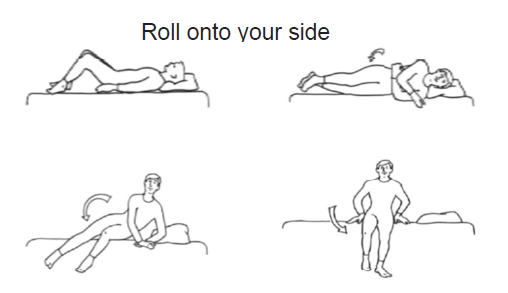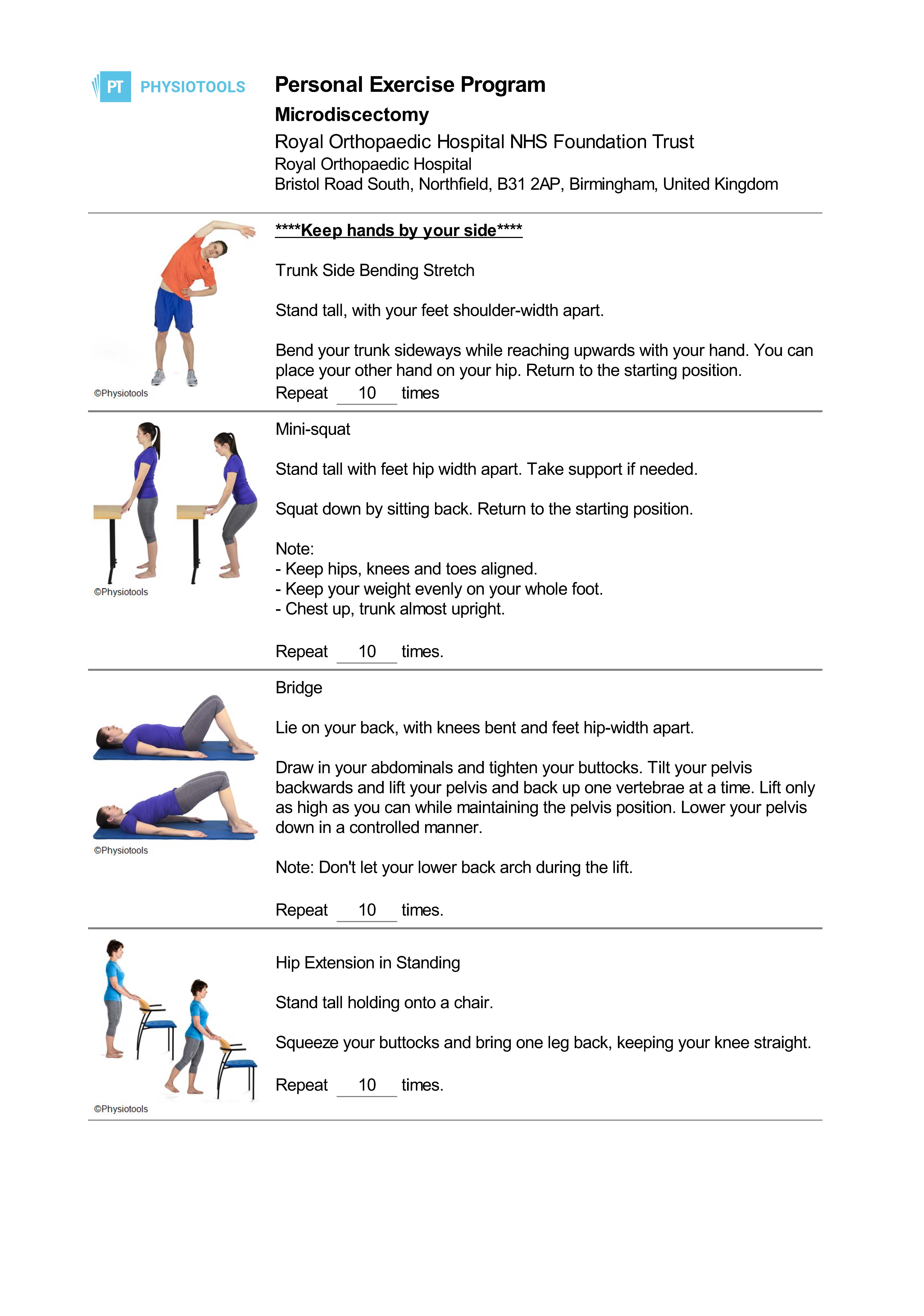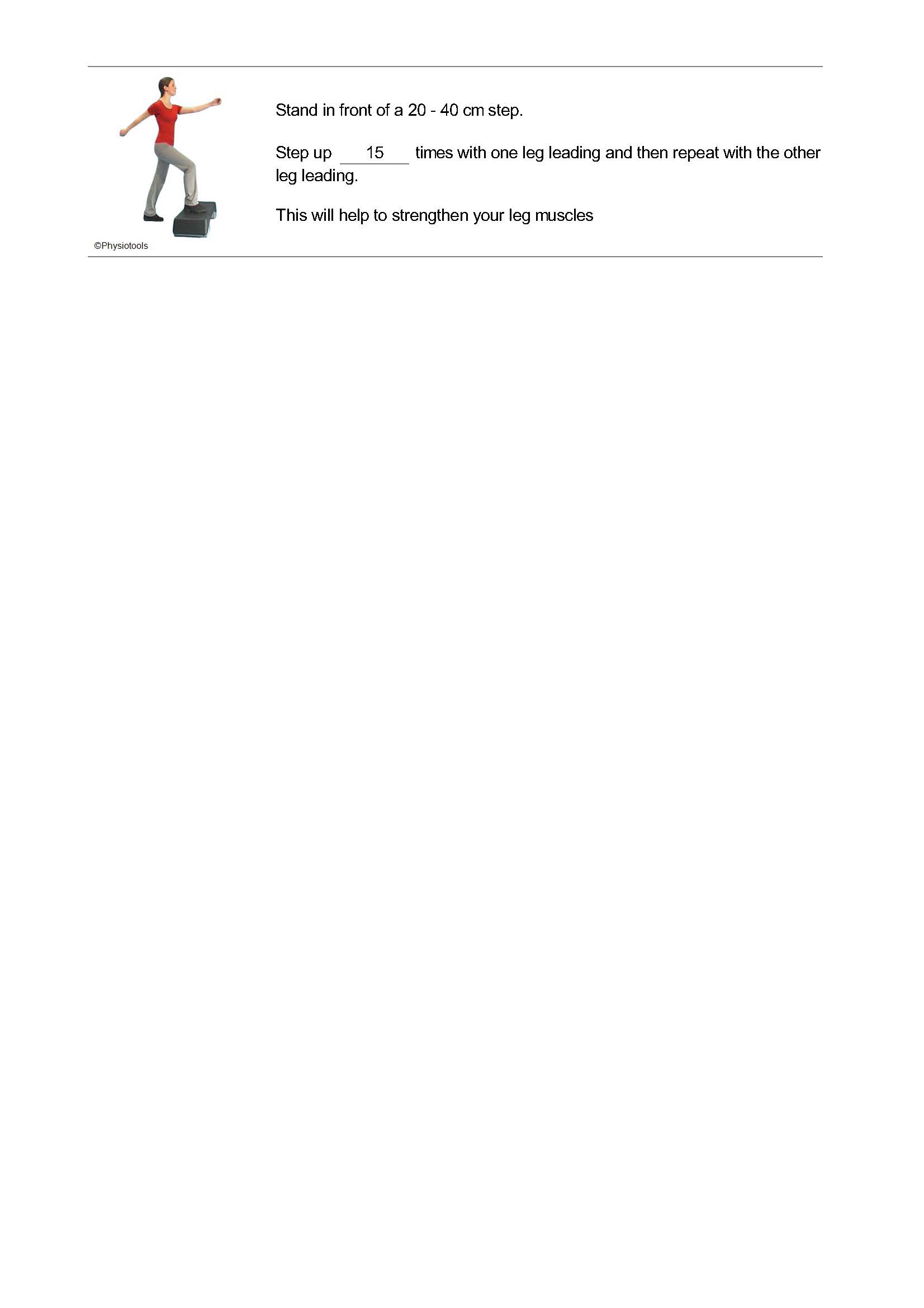
Microdiscectomy
What is a microdiscectomy/small decompression?
People having a microdiscectomy or decompression tend to suffer with leg pain due to pressure on one or more of the nerves around your spine. The surgery which you have had involves removing part of one or more of the discs (microdiscectomy) or removing a small piece of bone from your spine (decompression).This aims to remove pressure from the nerves which may have been causing you to have leg pain. It is not aimed at relieving back pain.
What should I expect afterwards?
You will be encouraged to get up and walk about within a few hours of your operation. Some patients are discharged on the day of surgery and most by the following day. Operations on more than one disc or at several levels in the spine may result in you staying in hospital a little longer.
If required you will be seen by a physiotherapist on the ward to ensure that you can get in and out of bed and mobilise safely. Not everyone needs to be seen by physiotherapy following your surgery therefore you can find more information in this leaflet on the common queries that patients have following surgery.
Getting out of bed
It is important to get out of bed as instructed by your physiotherapist (Log Roll) or as seen below. This ensures your back is in the correct position whilst you recover from your surgery.

When will my physiotherapy start?
You may be seen by a physiotherapist prior to your discharge from hospital, if not all the information you require is in this leaflet. They will show you how to get of bed and demonstrate exercises you should do following your surgery. The exercises aim to restore mobility and strengthen your muscles as well as well as increasing your fitness. These exercises should be done ideally twice a day. You may experience some discomfort in your back when doing these exercises. This is normal and to be expected.
If you start to get numbness, pins and needles or pain in either leg, stop exercising. If your leg symptoms persist for more than a few days consult your surgeon via phoning your discharging ward. For the first six weeks the main aim is to gradually increase mobility you will be reviewed in clinic at six weeks and if your consultant feels physiotherapy will be beneficial, they will refer you at this point.
Exercises
If you are seen by a physiotherapist, they will explain and demonstrate the following exercises to you. You may feel a little discomfort whilst doing the exercises although they should not provoke pain in your leg. Each exercise must be done ideally twice each day. You may choose to do them all together or break them up into smaller, more manageable sessions. Make sure you take regular walks throughout the day, gradually build up the distance as able.
General Advice
- Avoid slumping when sitting. Try to maintain a good posture. Try to avoid sitting for long periods (initially no longer than 30 minutes). Then gradually build up the length of time as comfortable.
- Walk as far as you are comfortable within the limits of your pain.
- Lifting needs to be undertaken with caution for the first 6 weeks especially in the first few weeks. Avoid heavy objects and note lighter but more bulky objects may cause as much trouble as smaller heavier objects.
- You may start swimming at 6 weeks (if your wound has healed). If you are unsure about this ask the nurse at your doctors.
- For the first 6 weeks post-surgery you will be advised to only undertake shoulder to pocket exercises.
Wound Care
If you develop any wound issues, for example as oozy wound, redness, swelling around the wound site, or a high temperature please liaise with either your GP in the first instance, or the ward you were discharged from if this is out of hours. If there are any wound concerns, please inform your consultants team via the secretary. The nursing staff will provide you with more information about wound care on discharge.
Pain Relief
It is normal to feel some pain after your surgery and you will be provided with some painkillers to help with this. It is important to take these as prescribed to keep pain to a minimum.
When can I return to work?
This will depend on the type of work you do. Discuss with your surgeon when you can return to work. As a guide, office based jobs can return to work at 6 weeks, light manual work 6-8 weeks and longer for heavy manual work.
When can I drive?
Generally you are not allowed to drive for 6 weeks following your surgery. Discuss this with your surgical team.
Leisure/Sport
This will also depend on the extent of the surgery you have had and what activities you want to return to. Your consultant can advise you further on this.
Other information
If you have any questions or need any advice about your exercises then please contact the Physiotherapy Department between 8am 4pm Monday to Friday on 0121 812 3500.

